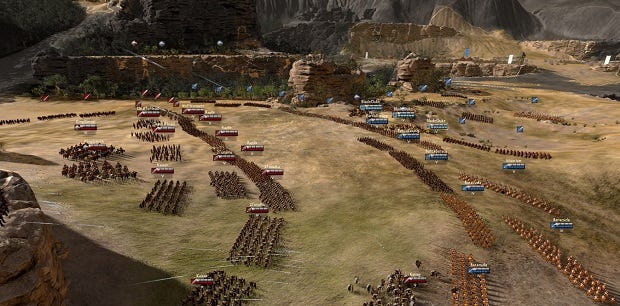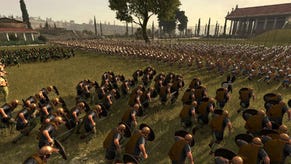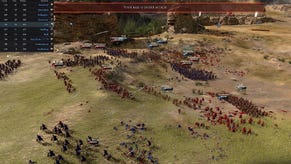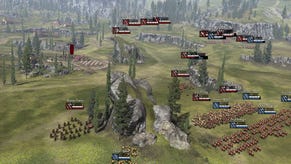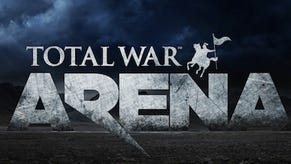Hands On: Total War - Arena
Total Teamwork
Total War: Arena reminds me of Magicka: Wizard Wars, a game that I'm extremely fond of. Wizard Wars took the chaotic elemental combos of Magicka and directed them into a team-based multiplayer showdown. If it had simply been a team deathmatch iteration of Arrowhead's original concept though, it wouldn't have captured my attention for quite as long as it did. Arena strikes a similar chord because it presents one aspect of Total War intelligently re-imagined as a short-form multiplayer game that hasn't forgotten its strategic roots. After an hour of play, I'm eager for more.
The new rules that control the flow of a match are the key to Wizard Wars' appeal, designed to encourage last minute heroics and to enable dramatic turnarounds on the scoreboard. Total War: Arena might just find a similar sweet spot in its clever commingling of competitive teamwork and strategic battles.
Built on the foundation of Total War's enormous historical battles, Arena pits two teams of ten against one another, giving each player three units to control. The current build, with which I played four rounds at a recent press event, is part of a closed alpha, and a closed beta is due in early 2015. As someone who enjoys the management and map-moulding of Total War far more than the combat, I wasn't convinced that a free to play multiplayer formation-fiddler was particularly desirable, but Arena seems smart, benefiting from the tight focus and well-designed maps.
There are only two maps at the moment, one fringed with forest with teams at opposite ends of a killing floor that is divided into three main battlefields. You might call those battlefields lanes, each providing a different route to the enemy's base which must be controlled for a set period of time to win the round. If several players occupy the base at the same time, the victory counter rises rapidly, but if the defenders manage to drive them out it will drop away again.
The second map has city streets in the bottom left and more open areas to the right. There are plenty of choke points in the city, which makes it ideal for the sort of rock, paper, scissors confrontations that are at the heart of Total War. Your three chosen units are likely to be a split between melee and ranged types to begin with, and my early melee troops were spearmen as were my opponents' on the whole. Throwing spearmen against spearmen reduces the possibility of feints and baiting to draw in cavalry, concealing counter units in the constantly updating blindspots in the visible lines of sight, but my most successful moments still involved deception.
Plant a row of tempting javelin-lobbers with light armour at a crossroads and one of your ten human opponents is likely to bite. As soon as they close in, your other units, armed to the teeth and clad in the strongest chestplates that money DELETE experience can buy, will be waiting to pounce. Flank, surround, crush morale and overcome.
A familiarity with the way Total War's battles work is helpful because the system at play here really is remarkably similar. The graphics may not be as fancy and the physics less physical - ensuring less pressure on the servers handling all of the data and a broader playerbase - but engagements play out just as they would in the core series. There are even commander units (one per player) secreted within units and losing them causes dismay to spread through the ranks. Formations have been simplified and everything moves at a faster clip, but positioning, elevation and careful timing of orders are as important as ever, as is an understanding of the big picture.
I find it hard to organise a trip to the cinema or the pub with ten people. Turns out military engagements in the classical era are even tricker than social gatherings. Our first two attempts were disastrous. On the forest map, we failed to use the cover of the trees to conceal our positions and found ourselves in a huge blob at the map's centre, surrounded on all sides. Massacred, I believe, before our enemies had even bothered to chip away at our base.
We'd all rushed straight into the fight, left no defenses and failed to consider the possibility that it might be sensible to utilise the terrain to our advantage. But put that down to enthusiasm. The next attempt was a definite improvement.
Fighting on the outskirts of the city, a plan coalesced even though we weren't exchanging strategies. Being very British, we rolled our eyes and chunnered about the disaster we'd just been a part of but didn't actually dare to instruct one another as to how it might be avoided during the next encounter.
That's when I realised that Arena is extremely well designed. Simple as they seem, there's an elegance to the design of the maps and it begins with the choice of starting position. When everyone has selected their commander and units, and pressed the button that tells the world they're ready to play, ten possible starting locations are displayed. As people select them, their name is attached, and because each spot has a clear objective - whether it be to defend a certain passage or form a perimeter around the base - it's entirely possible to evaluate each players' potential contribution and tactical approach by looking at the position they've chosen.
I planted myself on the outskirts of the city, between two allies. We would, I expected, move through the streets carefully, attempting to surround and overwhelm any enemies that approached. To my astonishment, that's exactly what we did. Not a single word was exchanged but we were able to read each others' intentions and work as a team. Because each player can see whatever his or her allies can see, separating into small groups within the confines of the streets allows for the greatest possible oversight. It also has the advantage of presenting a smaller visible front to the enemy.
As soon as we'd mopped up everyone in the area, we knew that the opposing team couldn't see any of our movements in that part of the map and, on top of that, they'd never had a clear idea of our numbers anyway, because we'd attacked from all sides, holding units back in reserve.
When you lose track of enemy units, you'll find yourself flicking to the map, trying to see where the fog of war has descended and then trying to calculate how many troops might be concealed in a particular blindspot. Essentially, the main feedback loop is about control of sight as much as territory. You want to fool your opponents into committing troops where they're wasted, or vulnerable to a counterattack, while keeping their eyes and arrows away from your main assault force.
Of course, you're trying to do all of that while struggling to keep a lid on the enemy's own surge toward your base, and while herding all of your allies.
Our second round ended in defeat but I did manage to occupy the enemy base, which was completely undefended. Unfortunately, I had one unit of (almost literally) decimated spearmen left, which meant the victory counter would have taken five minutes or so to reach 100%. Our base was occupied by seven or eight units and was due to fall in a few seconds. A heroic last minute retaliation pushed the enemy out of our base when the counter was at 99%, which led to actual cheers in the room, but the reprieve was shortlived, as were all of our soldiers.
Arena has lovely flow and sound strategic decision-making, which I hadn't expected at all. There aren't a hundred different unit types and specialisations to memorise, which is a relief. Simplicity of content and strategic complications seem to be the key and on the basis of this early and controlled playthrough, the game is on the right track.
Upgrades are earned through experience and the commander can use these to purchase special abilities, based on his traits. Most of these are triggered through a button press and they often have a cooldown. I had a charge skill for my spearmen, which caused them to smash through enemies like a bowling ball through pins, and a ranged ability that concentrated fire on a single point on the map for a few seconds. Later, I acquired the ability to drop shields mid-battle, lowering ranged defense but raising melee abilities.
Individual units rise through tiers, evolving into new types like Pokemon as they gain experience. They can spend their own collection of experience points, which is tied to their performance in each round, or they can spend the commander's own experience.
Along with experience and abilities, there is equipment and silver. That's where the monetisation comes in and, again, it's impossible to judge how it will work until the game is released. Equipment provides buffs - a stronger sword means your unit causes more damage in melee combat, better armour means it takes less damage.
I was earning silver quickly enough to buy every equipment upgrade available but there are also boosts that last for a certain number of rounds. The developers told me, in an interview to be published later this week, that paying for silver is only necessary for those who want to speed their way through the tiers. Whether the amount of currency needed will rise steeply between tiers, I can't say, but at the lower levels the sense of progression seems to be well-tuned. There's a 'Gold' currency as well but it's purely for cosmetic items and units.
Arena will need a decent community if it is to flourish, and plenty of tech support to ensure it can accommodate the enormous battles it's aiming for. The design is good though, taking one component of the parent series and tweaking it in all the right places. It's far more pleasant than the MOBA-esque clash of heroes I suspected I might be stuck with for an hour. It's fast but intelligent, with a good central flow and strategies that are easy to read and implement. It's handsome too, avoiding clutter to present battles that are clean and instantly legible.
A surprise, and a very pleasant one.
We'll have an interview with the team behind Total War: Arena later this week. Signups for upcoming alphas/betas are open now.
